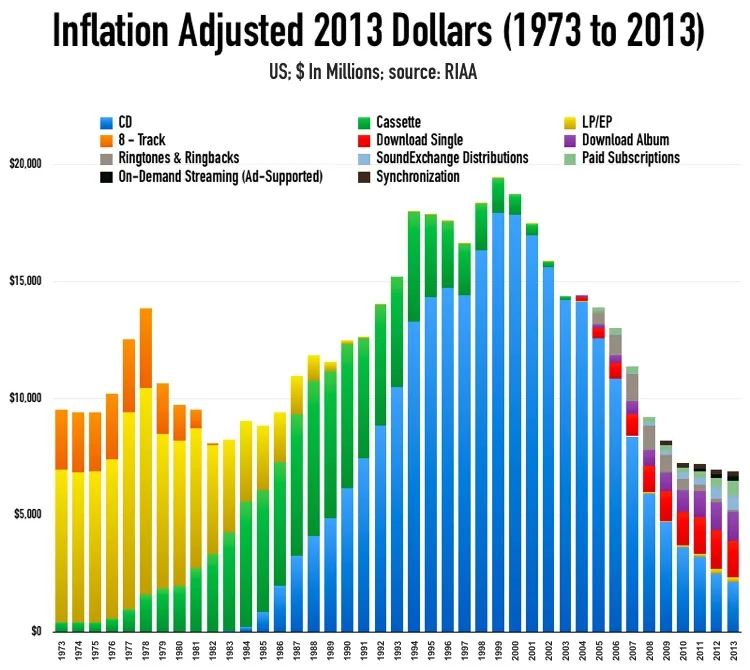
Money is the y-axis, and time is the x-axis. The gold bars represent sales of LPs, which were the dominant medium for music when the graph begins in 1973. LPs steadily lost market share to cassettes (green bars) which were propelled by the Dolby noise reduction system and the chromium dioxide tape. The 8-track medium (orange bars) died quickly. Cassettes, which had a synergistic relationship with Sony's Walkman product, had stable sales over a long period of time. But the introduction of CDs (blue bars) quickly killed off what remained of the LP business. It took Sony engineers a while to make an inexpensive but reliable CD read mechanism; when the Discman reached store shelves, sales of cassettes plummeted too.
And thus the popular music business peaked in 1999, when a single medium — the CD — generated almost all sales. 1999, however, was the beginning of the Internet bubble. Technologies like Napster allowed users to duplicate digitized music at virtually no cost.
Sales of CDs today are roughly the same as sales of 8-tracks in 1973. Now you see why nearly all free-standing music stores have closed. The digital market, in terms of what music actually generates money, has fragmented into a dynamic mix of media and business models. Ringtones have come and gone already. Not only is the mix unpredictable, the aggregate size of the market is smaller than 40 years ago. That's tough on business.
Consumers have been quite willing to ignore copyrights in order to save money. As an intellectual property professional, I have misgivings about that. On the other hand, the big music companies had been greedy by overpricing their product. Consumer backlash was the natural consequence. Labels tried to use litigation and coercive technology (e.g. digital rights management) to reverse the trend, but they failed. I don't feel particularly sorry for them.
I suspect that to some extent, the best musicians are making themselves whole financially by raising the prices of concert tickets to levels that were unimaginable just 20 years ago and by leveraging their personal brands into endorsements, clothing, etc. The lesser names in music must be more creative in generating income and in getting market traction to begin with. Record labels no longer have the money to invest in prospective talent. But even if the path to success used by Madonna or Mariah Carey is no longer available, talent like Taylor Swift are finding new paths to prominence. The music business isn't dead. It's just different.
